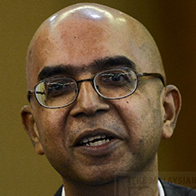This Christmas, many have tried to reduce the public presence of the festival.
 The Sultan of Brunei hogged the news in Malaysia. He owns the Royal Plaza Hotel in Singapore. Some of my friends liked to stay there because beer in the bedroom fridge was complimentary; and they enjoyed the nightclub on the first floor.
The Sultan of Brunei hogged the news in Malaysia. He owns the Royal Plaza Hotel in Singapore. Some of my friends liked to stay there because beer in the bedroom fridge was complimentary; and they enjoyed the nightclub on the first floor.
Last year, many including the likes of Sir Richard Branson and Ellen DeGeneres, urged people to avoid the Sultan’s hotels.
They stopped because the Sultan introduced Shariah law in Brunei. He added amputation and stoning to the punishments for people who commit offences in Brunei.
According to news reports, 65% of the population of Brunei are Muslims.
Based on the claim that public reminders about “the Christian faith” can cause Muslims to stumble, public celebrations were banned – no festive decorations, no carols in public places.
I must say it would be nice to be free of the consumerism of Christmas. I don’t appreciate associating snow, reindeer, mistletoe and pine trees with Christmas.
I also don’t appreciate obtaining a “consumerism free” Christmas through the threat of a five-year jail term for anyone who violate the ban.
The Sultan owns the Dorchester chain of hotels which has properties in London, Paris and Beverley Hills. It’s been reported that these properties were dressed for Christmas.
So it’s not that the Sultan wants to suppress expressions of Christmas. He just wants to preserve Brunei Muslims.
Somalia and Tajikistan also banned Christmas.
Somalia said the ban was partly to protect people from attacks by al-Shabaab, a militant Islamic group. (It’s not cool to call people terrorists).
As The Guardian pointed out, there are thousands of foreign, Christian peacekeepers in Somalia.
Last year they received a Christmas gift from al-Shabaab – three dead peacekeepers, one dead civilian contractor and much more after an attack on their base in Mogadishu.
Tajikistan has set the standard for banning Christmas. It came up with a comprehensive list of forbidden acts. The list extends beyond Christmas trees, Father Frost (the Russian version of Santa) and gift-giving to festive meals and charity.
I wonder how many Muslim majority nations registered protests with the governments of Brunei, Somalia and Tajikistan. I expect Malaysia didn’t.
What does Christmas mean to those who hate the consumerism it has come to mean This Christmas, my pastor reminded us of the awakening of grumpy Grinch.
In the words of Dr Seuss, “What if Christmas, he thought, doesn't come from a store? What if Christmas, perhaps, means a little bit more.”
During our Christmas service a choir sang songs about Christ. The songs were connected by readings from the Bible. The readings were about fore-tellings (prophecies) about Jesus the Christ, the Messiah, and his birth and life.
Explaining why he’s called “Christ” is a little easier this year because our Christmas service included baptisms. Two candidates were baptised.
Our pastor took them through their confession of Christ and their vows. Then, he baptised them.
He wet his fingers with water and rubbed the shape of the cross 3 times on the forehead of each candidate.
The act of rubbing (with oil) is, in Hebrew, mashiah: the Bible tells of prophets who anointed persons and made them kings.
By performing mashiah upon them, my pastor admitted them into the worldwide community of Christians.
Transliterated, the word is “Messiah,” in English. It means “anointed;” the Greek is khristos; the Latin is christus.
Christians believe – on the basis of prophecies about him, his virgin birth, his baptism and his acts – that that child born in Bethlehem is the anointed one, Christ, the liberator. The prophecies said the Christ would liberate a captive people.
The prosperous Temple leaders, who knew the prophecies well, persuaded their Roman benefactors that Jesus, the Messiah, was a threat to Roman rule. So the Romans meted out to Jesus the punishment for insurrectionists: crucifixion.
Jesus submitted. Other prophecies about him were fulfilled. People became Christ-followers. They lost their jobs; they became food for lions.
That explains “Christ,” the first part of “Christmas.”
The second part is from mass, the Latin for “dismiss.” At the end of each service the pastor dismisses the congregation with the words,“Go in peace and serve Christ.”
It meant to go forth and serve in broken-ness, after encountering the broken-ness of Christ who came to serve the world.
Serving Christ doesn’t mean seemingly harmless, consumerist Christianity. It means peaceful, relentless action for peace in the world in the name of the Prince of Peace.
Despite what Brunei, Somalia and Tajikistan do, Christians will still serve Christ. – December 31, 2015.
* This is the personal opinion of the writer or publication and does not necessarily represent the views of The Malaysian Insider.


Comments
Please refrain from nicknames or comments of a racist, sexist, personal, vulgar or derogatory nature, or you may risk being blocked from commenting in our website. We encourage commenters to use their real names as their username. As comments are moderated, they may not appear immediately or even on the same day you posted them. We also reserve the right to delete off-topic comments